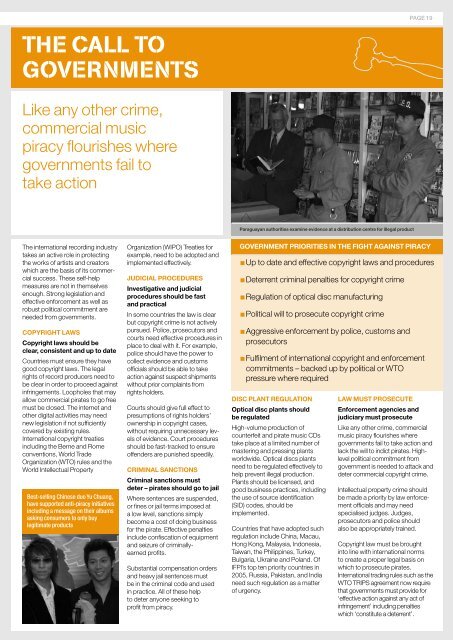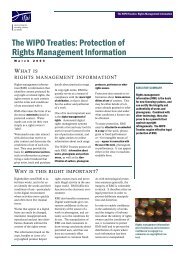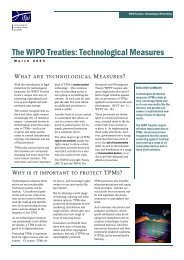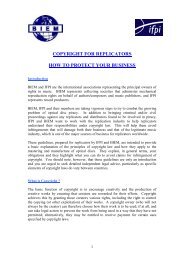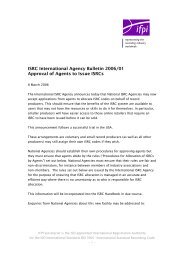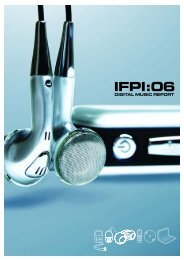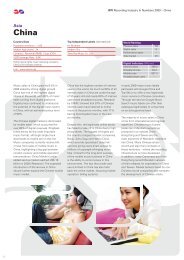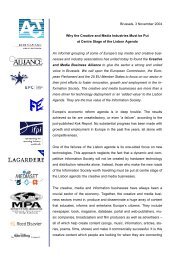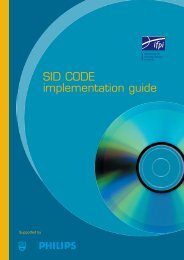*IFIC 20ppv3 - IFPI
*IFIC 20ppv3 - IFPI
*IFIC 20ppv3 - IFPI
Create successful ePaper yourself
Turn your PDF publications into a flip-book with our unique Google optimized e-Paper software.
PAGE 19<br />
THE CALL TO<br />
GOVERNMENTS<br />
Like any other crime,<br />
commercial music<br />
piracy flourishes where<br />
governments fail to<br />
take action<br />
Paraguayan authorities examine evidence at a distribution centre for illegal product<br />
The international recording industry<br />
takes an active role in protecting<br />
the works of artists and creators<br />
which are the basis of its commercial<br />
success. These self-help<br />
measures are not in themselves<br />
enough. Strong legislation and<br />
effective enforcement as well as<br />
robust political commitment are<br />
needed from governments.<br />
COPYRIGHT LAWS<br />
Copyright laws should be<br />
clear, consistent and up to date<br />
Countries must ensure they have<br />
good copyright laws. The legal<br />
rights of record producers need to<br />
be clear in order to proceed against<br />
infringements. Loopholes that may<br />
allow commercial pirates to go free<br />
must be closed. The internet and<br />
other digital activities may need<br />
new legislation if not sufficiently<br />
covered by existing rules.<br />
International copyright treaties<br />
including the Berne and Rome<br />
conventions, World Trade<br />
Organization (WTO) rules and the<br />
World Intellectual Property<br />
Best-selling Chinese duo Yu Chuang,<br />
have supported anti-piracy initiatives<br />
including a message on their albums<br />
asking consumers to only buy<br />
legitimate products<br />
Organization (WIPO) Treaties for<br />
example, need to be adopted and<br />
implemented effectively.<br />
JUDICIAL PROCEDURES<br />
Investigative and judicial<br />
procedures should be fast<br />
and practical<br />
In some countries the law is clear<br />
but copyright crime is not actively<br />
pursued. Police, prosecutors and<br />
courts need effective procedures in<br />
place to deal with it. For example,<br />
police should have the power to<br />
collect evidence and customs<br />
officials should be able to take<br />
action against suspect shipments<br />
without prior complaints from<br />
rights holders.<br />
Courts should give full effect to<br />
presumptions of rights holders’<br />
ownership in copyright cases,<br />
without requiring unnecessary levels<br />
of evidence. Court procedures<br />
should be fast-tracked to ensure<br />
offenders are punished speedily.<br />
CRIMINAL SANCTIONS<br />
Criminal sanctions must<br />
deter – pirates should go to jail<br />
Where sentences are suspended,<br />
or fines or jail terms imposed at<br />
a low level, sanctions simply<br />
become a cost of doing business<br />
for the pirate. Effective penalties<br />
include confiscation of equipment<br />
and seizure of criminallyearned<br />
profits.<br />
Substantial compensation orders<br />
and heavy jail sentences must<br />
be in the criminal code and used<br />
in practice. All of these help<br />
to deter anyone seeking to<br />
profit from piracy.<br />
GOVERNMENT PRIORITIES IN THE FIGHT AGAINST PIRACY<br />
■ Up to date and effective copyright laws and procedures<br />
■ Deterrent criminal penalties for copyright crime<br />
■ Regulation of optical disc manufacturing<br />
■ Political will to prosecute copyright crime<br />
■ Aggressive enforcement by police, customs and<br />
prosecutors<br />
■ Fulfilment of international copyright and enforcement<br />
commitments – backed up by political or WTO<br />
pressure where required<br />
DISC PLANT REGULATION<br />
Optical disc plants should<br />
be regulated<br />
High-volume production of<br />
counterfeit and pirate music CDs<br />
take place at a limited number of<br />
mastering and pressing plants<br />
worldwide. Optical discs plants<br />
need to be regulated effectively to<br />
help prevent illegal production.<br />
Plants should be licensed, and<br />
good business practices, including<br />
the use of source identification<br />
(SID) codes, should be<br />
implemented.<br />
Countries that have adopted such<br />
regulation include China, Macau,<br />
Hong Kong, Malaysia, Indonesia,<br />
Taiwan, the Philippines, Turkey,<br />
Bulgaria, Ukraine and Poland. Of<br />
<strong>IFPI</strong>’s top ten priority countries in<br />
2005, Russia, Pakistan, and India<br />
need such regulation as a matter<br />
of urgency.<br />
LAW MUST PROSECUTE<br />
Enforcement agencies and<br />
judiciary must prosecute<br />
Like any other crime, commercial<br />
music piracy flourishes where<br />
governments fail to take action and<br />
lack the will to indict pirates. Highlevel<br />
political commitment from<br />
government is needed to attack and<br />
deter commercial copyright crime.<br />
Intellectual property crime should<br />
be made a priority by law enforcement<br />
officials and may need<br />
specialised judges. Judges,<br />
prosecutors and police should<br />
also be appropriately trained.<br />
Copyright law must be brought<br />
into line with international norms<br />
to create a proper legal basis on<br />
which to prosecute pirates.<br />
International trading rules such as the<br />
WTO TRIPS agreement now require<br />
that governments must provide for<br />
‘effective action against any act of<br />
infringement’ including penalties<br />
which ‘constitute a deterrent’.


